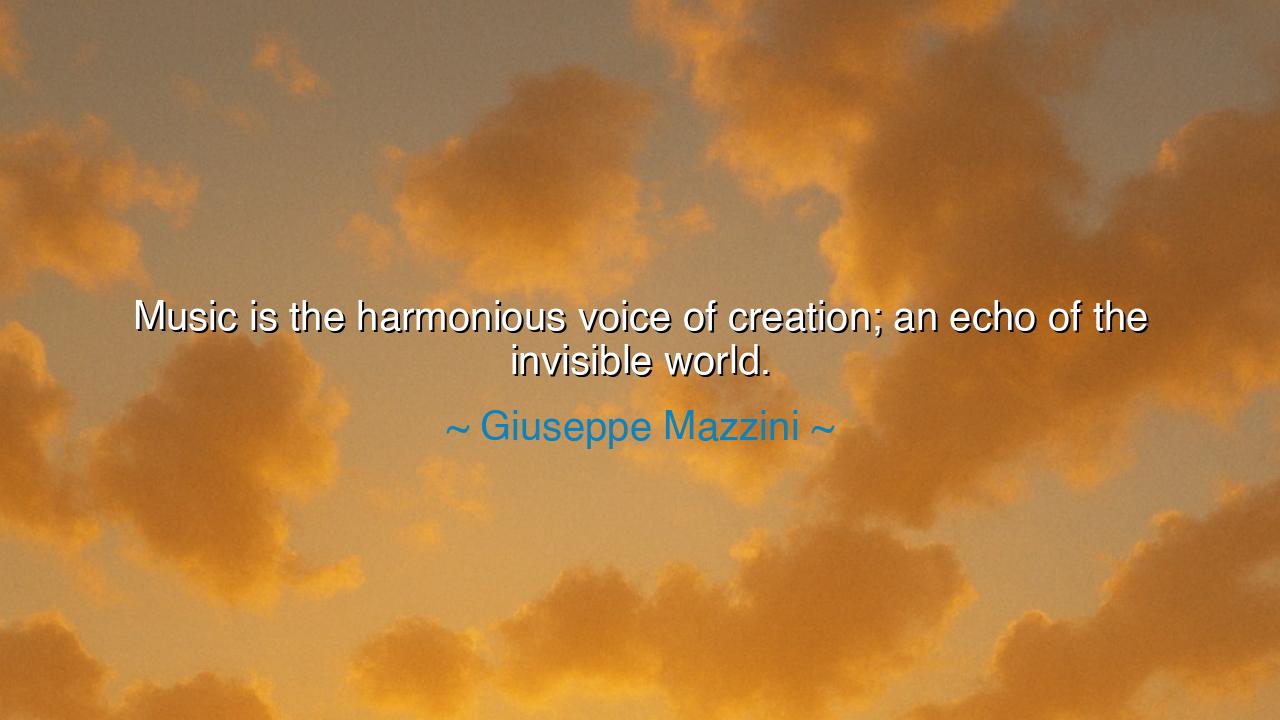
Music is the harmonious voice of creation; an echo of the






Giuseppe Mazzini, a man who was both revolutionary and philosopher, once proclaimed: “Music is the harmonious voice of creation; an echo of the invisible world.” These words carry the weight of eternity, for they speak of music not merely as sound, nor as entertainment, but as a cosmic force—an expression of the divine order that binds all things. In his vision, music is not created by man alone; it is discovered, drawn from the fabric of existence itself, resonating with truths too deep for words.
The ancients would have nodded in recognition. The Pythagoreans believed that the heavens themselves moved in tones—the “music of the spheres”—each planet singing in harmony as it circled the cosmos. For them, music was mathematics made audible, the voice of creation woven into number and rhythm. The Vedic sages of India taught that the primordial sound, Om, was the first vibration, the root of all existence, the original echo of the invisible world. Mazzini, though living centuries later, stood in the same tradition: the belief that music is not human invention, but revelation.
Consider the story of Beethoven, who wrote his Ninth Symphony while deaf. Though cut off from the sounds of earth, he somehow heard the voices of heaven. His music was born not from ears but from the soul itself. How can this be explained, except through Mazzini’s truth—that music is an echo of realms unseen, a gift that transcends the senses and connects mortals to the divine? When the “Ode to Joy” rang for the first time, it was as if the very heart of creation sang through him.
Mazzini himself was a revolutionary who sought to unite Italy, and for him, music was not only divine but political, a unifying force that could awaken nations. He believed it lifted men beyond selfishness and reminded them of their shared destiny. To call music the “harmonious voice of creation” was also to declare that it speaks to what binds us together as humanity. Where words divide, melody unites. Where politics falters, song inspires. Thus, music becomes both cosmic and earthly, both spiritual and practical—a force of transformation.
The meaning of his words is vast. If music is the voice of creation, then when we make or listen to music, we are touching eternity. It is no wonder that even the simplest song can stir tears, awaken memories, or inspire courage in battle. These are not mere emotional tricks—they are reminders that in the vibrations of sound, we sense the deeper vibrations of existence itself. We are moved because, in truth, we are hearing the echo of what gave us life.
The lesson for us is both humbling and empowering. When you hear music, listen not casually, but reverently. Let it awaken you to beauty beyond words. When you make music, whether by instrument, voice, or even the rhythm of your steps, remember that you are joining in a cosmic chorus that began long before you and will continue long after. Music reminds us that we are not alone, that the invisible world is near, and that within creation itself, harmony is possible.
Therefore, let each soul embrace music as both teacher and companion. Use it not only for pleasure, but for strength in hardship, for healing in sorrow, for unity with others. Seek out the songs that lift your heart toward courage, that remind you of love, that awaken you to truth. And if you can, create music of your own—whether for one or for many—so that you too may give voice to the echo of the invisible world that flows through you.
Thus Mazzini’s words endure: “Music is the harmonious voice of creation; an echo of the invisible world.” They teach us that music is not mere pastime, but a glimpse into the eternal, the vibration of the cosmos itself. To live by them is to honor music as sacred, to let it shape not only our ears but our souls, guiding us into harmony with one another and with the universe itself.






AAdministratorAdministrator
Welcome, honored guests. Please leave a comment, we will respond soon